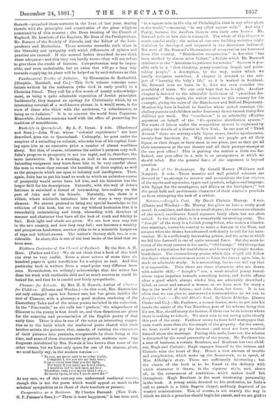in a square mile in the city of Philadelphia than
in any other place in the world,"—meaning, " in any other square mile." And why ? Partly, because the dwellers therein own their own houses. Mr. Barnard tells us how this is managed. The whole of this chapter is worth careful study ; the action of our own building societies might doubtless be developed and improved in the directions indicated. But most of Mr. Barnard's illustrations of co-operation are borrowed from this country. " Distribntive co-operation " in America "has been marked by almost utter failure," a failure which Mr. Barnard attributes to the " American impatience for results." Success is pos- sible only to a "slow-thinking, penny-counting, frugal, and pains- taking people," a description, by the way, under which we hardly recognise ourselves. A chapter is devoted to the sub- ject of " insuring the baby's life," as it is worked in Scotland. Mr. Barnard sees no harm in it, does not even consider the possibility of harm. We can only hope that he is right. Another chapter is devoted to the admirable institution of "provident dis- pensaries." Here, again, the writer comes to this country for his example, giving the rules of the Manchester and Salford Dispensary. Membership here is limited to families whose united earnings (in- cluding parents and children under fourteen) do not exceed thirty-five shillings per week. The " conclusion " is an admirably effective argument on behalf of the " Co•operative distribution system." The waste of labour under the competition system is explained by giving the details of a district in New York. In one part of "Third Avenue " there are seventy-eight liquor stores, twelve apothecaries, twenty-four butchers, &c. Why should not people got all their liquor, or their drugs, or their meat at one place, just as they get all their amusement at the one theatre and all their postage-stamps at the one post office ? This is pushing the matter a little too far. Indeed, one post-office in a mile is an arrangement at which we should rebel. But the general force of the argument is beyond question.






































 Previous page
Previous page